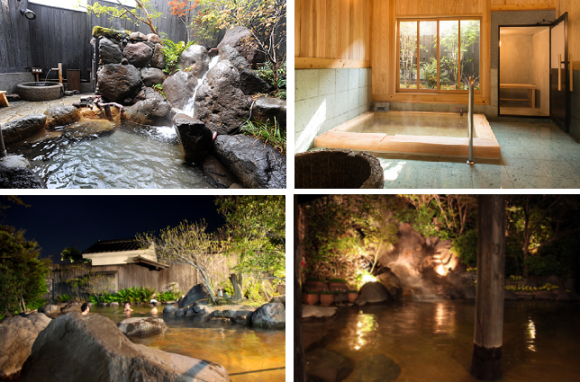
Even though the prefecture is home to barely a million residents, Oita has not one, but two famous hot spring resorts. Yufuin is generally held to be the more refined and tastefully restrained of the pair, while Beppu, despite having some of the most popular hot springs in Japan, gets saddled with the reputation as the more touristy town.
While there may be some truth to the labels, there’s one thing Beppu has that you won’t find in Yufuin, or anywhere else in the country for that matter: Japan’s only hot spring with three Michelin stars.
The high praise for Beppu’s Hyotan Onsen isn’t the result of a single evaluator getting swept up in the heat of the moment, either, as it’s been the recipient of Michelin stars for four consecutive years. Considering that Hyotan Onsen seems to be exactly what Michelin is looking for, we’re a little surprised it took them so long to notice the facility, since it’s been open since 1922.
Michelin hasn’t revealed the exact criteria by which it judges hot springs, but Hyotan Onsen’s lengthy list of attractions provide plenty of justification for its three stars. Admission is a reasonable 750 yen (US$7.35), or just 560 yen if you arrive after 6 p.m., and the expansive facility has eight male and eight female baths.
The baths have been kept in the same traditional style as they were 90 years ago, with tubs made of natural materials such as rock and Japanese cypress. The most dynamic is the Taki no Yu, or Waterfall Bath, with a series of 19 spouts of water cascading down from three meters (9’10”) above to warm and massage your shoulders, neck, and back.
It’s not just the number and variety of baths that draw visitors to Hyotan Onsen but the quality of the water itself. Taken directly from the spring, the water contains an extremely high content of metasilicic acid, which despite its somewhat frightening name is an excellent natural skin moisturizer.
There is one problem, though, which is that at the source the water is 100 degrees Celsius, which means it’s quite literally boiling. While you could cut it with cool water to bring the temperature down, doing so would also dilute its therapeutic mineral content. In order to keep its bathwater all-natural, Hyotan Onsen devised what it’s dubbed the Yumetake, coming from the kanji characters for “bath water,” “rain,” and “bamboo.”
The scalding water is poured over the bamboo framework, and as it flows down it cools in a matter of seconds to 47 degrees. This leaves it more than warm enough for a relaxing soak, but not so hot that it’ll start cooking anyone who sets foot in the tub.
An additional 330 yen gives you a chance to lounge in the sand bath, which is warmed by the hot spring flowing beneath the ground.
Hot spring water isn’t just for soaking in and heating up sand baths, though. It can also be used to cook by steaming various ingredients. Hyotan Onsen’s restaurant serves a number of set meals, and there’s also a casual outdoor terrace where you can enjoy Japanese-style comfort food such as curry and chicken tempura while still dressed in your cotton yukata robe.
If you’re craving dessert, there’s also onsen-cooked pudding, and Hyotan Onsen’s unique soft-serve ice cream called Yuraku Yura Soft, which contains gelatin made with the hot spring water.
There’s even a fountain from which you can drink the hot spring water itself, which is said to somehow alleviate both constipation and diarrhea.
▼ We’re no doctors, but really, we tend to think of the solutions to those two problems involving slides in opposite directions on the scale.
Aside from all this, Hyotan Onsen also has private family baths, both indoor and outdoor, which can be rented out by the hour. There’s also a free foot bath for those who want to experience the soothing waters while still keeping their clothes on.
If all this has you ready to pack your bags, the next thing you’ll need to do is find your way down to Oita Prefecture and Beppu Station, from where it’s a 25-minute bus ride to Hyotan Onsen. The facility is open from 9 a.m. until 1 o’clock the next morning, and with so many spots to relax, we don’t think we’d have any trouble using up all that time.
Related: Hyotan Onsen English website
Sources: Tabinesu, Hyotan Onsen
Top image: Hyotan Onsen
Insert images: Hyotan Onsen